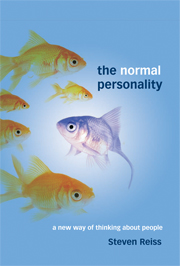Book contents
- Frontmatter
- Contents
- Acknowledgments
- Overview
- 1 My Wife Thinks Something Is Wrong with Me
- 2 The Sixteen Basic Desires
- 3 Intensity of Basic Motivation
- 4 Normal Personality Types
- 5 Overcoming Personal Troubles
- 6 Six Reasons for Adolescent Underachievement
- 7 Self-Hugging and Personal Blind Spots
- 8 Relationships
- 9 Reinterpretation of Myers-Briggs Personality Types
- 10 The Sixteen Principles of Motivation
- APPENDIX A Dictionary of Normal Personality Traits
- APPENDIX B Reiss Motivation Profile Estimator
- APPENDIX C The Sixteen Basic Desires at a Glance
- Notes
- References
- Index
1 - My Wife Thinks Something Is Wrong with Me
Published online by Cambridge University Press: 05 June 2012
- Frontmatter
- Contents
- Acknowledgments
- Overview
- 1 My Wife Thinks Something Is Wrong with Me
- 2 The Sixteen Basic Desires
- 3 Intensity of Basic Motivation
- 4 Normal Personality Types
- 5 Overcoming Personal Troubles
- 6 Six Reasons for Adolescent Underachievement
- 7 Self-Hugging and Personal Blind Spots
- 8 Relationships
- 9 Reinterpretation of Myers-Briggs Personality Types
- 10 The Sixteen Principles of Motivation
- APPENDIX A Dictionary of Normal Personality Traits
- APPENDIX B Reiss Motivation Profile Estimator
- APPENDIX C The Sixteen Basic Desires at a Glance
- Notes
- References
- Index
Summary
We will compare psychodynamic versus motivational explanations of organized and disorganized personality traits. According to psychodynamic theory, these personality traits are determined by unconscious mental forces set in motion during early childhood. According to motivation analysis, personality traits are determined by intrinsically held values and life motives (variously called basic desires or psychological needs).
A Disorganized Person
Even the dullest observers of human nature notice that I am disorganized. My office is a mess: My files are on the floor with papers falling out of them, and my wastebasket is overflowing with paper trash. My coat is thrown on a chair, and my hat is misplaced where even I cannot find it. Every winter I need a half dozen pairs of gloves because I keep losing them.
My wife, Maggi, cleans my office whenever I leave town on a business trip. Instead of returning home and exclaiming, “What a wonderful wife you are – you straightened and cleaned my office,” I complain, “I can't find my academic papers on anxiety! What did you do with them? Please make my office the way it was when I left.”
I hate following schedules and have a tendency to arrive for appointments at the last second. I was at least 30 years old when I first bought an appointment book. Despite this major concession to organizing values, I continue to rush to appointments at the last minute just as I had before I used appointment books.
- Type
- Chapter
- Information
- The Normal PersonalityA New Way of Thinking about People, pp. 9 - 19Publisher: Cambridge University PressPrint publication year: 2008



